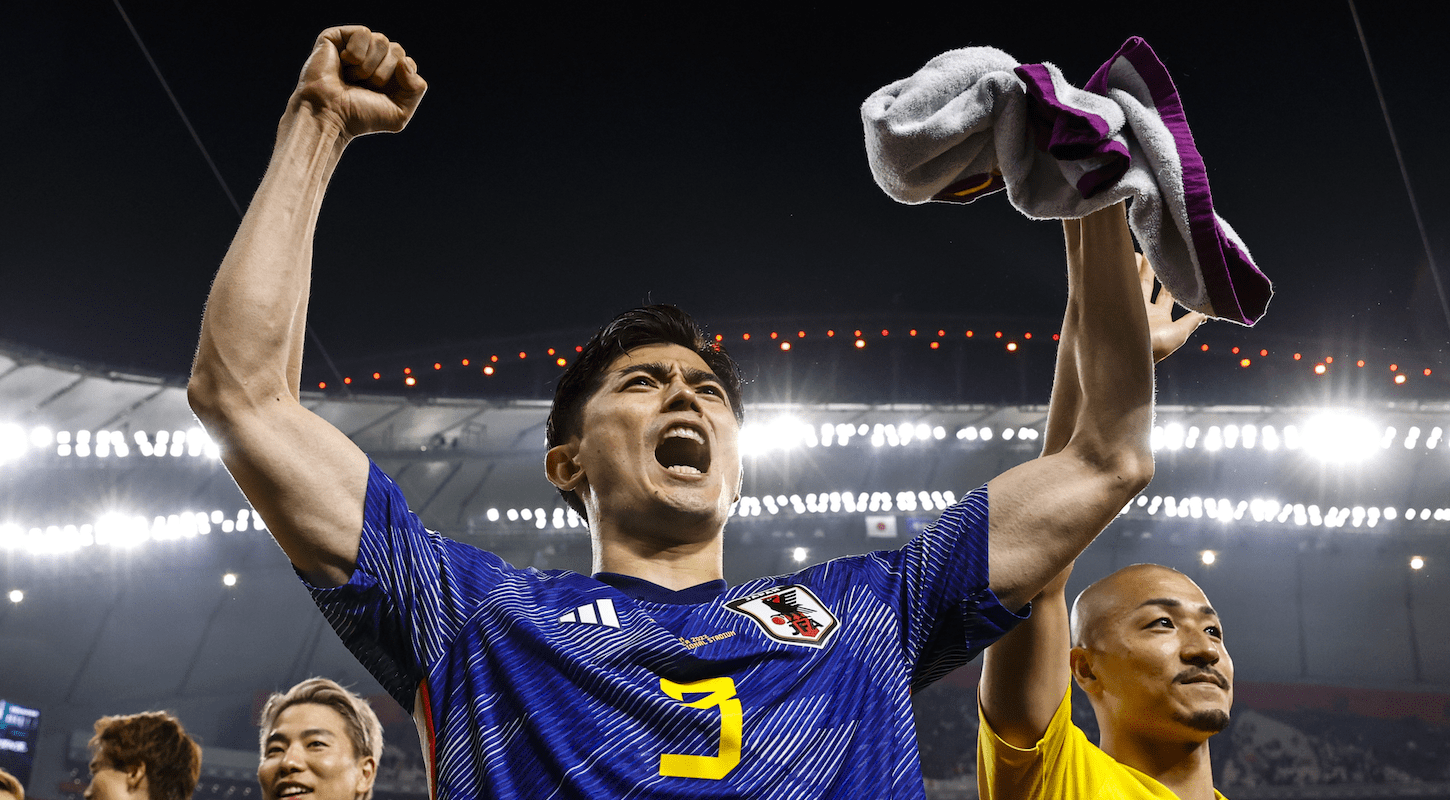Japan held two teams' fates in its hands coming into Thursday's final round of Group E matches in the World Cup. Sort of funnily, neither of them was its opponent on the day, Spain.
The match day set up like this: Japan entered the day second in the group, with three points, thanks to its shock win over Germany on the group's first match day. Spain led the group with four points, and with passage through to the round of 16 all but guaranteed by its plus-6 goal differential. Costa Rica's third-place position felt like last place, owing to a horrible goal differential and the safe assumption that Los Ticos' opponents on the day, Germany, would flatten them; Germany's fourth-place position felt like second, despite the team coming into the day on a single lonely point, at least in large part because it is Germany.
So:
- Spain would win the group with a win over Japan. Unless Costa Rica beat the living shit out of Germany, Spain would also win the group with a draw against Japan. La Roja would advance from second place in basically any other plausible scenario. The only outcomes that would threaten outright elimination were pretty far-fetched: Spain losing to Japan while Costa Rica beat Germany outright, or extremely unlikely scenarios in which a Spain loss and a Germany win combined to wipe away Spain's huge goal-differential advantage over the whole rest of the group.A fun wrinkle here is that Spain came into the day with very little incentive to push hard for a win: Taking the group outright would put the Spaniards on a path to meet Brazil, the tournament favorites, in the quarterfinal, whereas advancing from second place would line them up with ... well, not Brazil.
- Japan would win the group with a win over Spain coupled with a Costa Rica loss or draw against Germany. Japan could also, in theory, advance in second place with a draw against Spain, in the unlikely event both Group E games ended that way, because in that event the Samurai Blue would finish with a better goal differential than Costa Rica and more points than Germany. Given the strong likelihood that Germany would beat Costa Rica, Japan entered Thursday's game effectively operating under a win-or-die mandate.
- Costa Rica could win the group outright with a very unlikely win over Germany, if Spain-Japan ended in a draw. Los Ticos could also, in theory, finish second and advance to the knockouts with a draw against the Germans, if Spain beat Japan by, like, seven goals or something, wiping out Japan's goal-differential advantage over Costa Rica. For all practical purposes this amounted to a win-and-get-some-help-or-die mandate for Costa Rica.
- The Germans, shock losers to Japan in their first match of the tournament—one they dominated for all but a few decisive minutes—could not win the group under any circumstances. But they could take second with a little help, if they beat Costa Rica and, as pretty much everyone on earth expected would happen, Spain beat Japan. They could also take second and advance if Spain and Japan finished in a draw, if Germany beat Costa Rica by two or more goals, to give it a goal differential stronger than Japan's. A draw or loss against Costa Rica would eliminate Germany, as would any halfway-plausible scenario in which Japan beat Spain. (In theory, if Japan beat Spain by like seven goals, Germany could leapfrog the Spaniards on goal differential, but that was not going to happen and isn't worth considering.) So Germany, too, entered Thursday under win-or-die circumstances.
The important stuff to know about that big pile of tangled spaghetti is this: Germany's passage through to the round of 16 seemed—seemed—about as sure, at the beginning of Thursday's games, as a last-place team's possibly can be. For that matter it seemed nearly as sure as a second-place team's can be. The Germans had looked outstanding for all but a handful of minutes across their first two matches, and seemed like mortal locks to beat Costa Rica handily. But! They'd left Japan's hands on their steering wheel. Nothing that happened in the Germany-Costa Rica game would matter all that much, unless Japan allowed it.
It's kind of fun to think of how that likeliest-seeming outcome—Germany beating Costa Rica, Japan losing or drawing against Spain, Spain and Germany advancing—could have reached back and rearranged how anybody saw what came before it. Germany's stunning loss to Japan would appear an all but meaningless fluke, nothing more the jolt one of the sport's heavyweights needed to wake itself up and take matters seriously. In light of how good Germany looked outside of the few minutes Japan blitzed it for a pair of goals, how brilliant and ascendant young Jamal Musiala appeared throughout the group stage, previews of Germany's round-of-16 game would invoke the memory of the 2010 Spain team that lost its first group-stage game and then went on to win the whole tournament. (Previews of Argentina's round-of-16 game will do this, now.) In light of Japan's loss to Costa Rica, and the horrifying blown opportunity it represented, the win against Germany wouldn't even be particularly inspiring in retrospect, just a glimmer of false hope conjured by a bunch of frauds.
The early stages of Thursday's games went as scripted. Germany scored a 10th-minute goal to get ahead of Costa Rica. One minute later, Spain grabbed one of its own, through Álvaro Morata; Japan had barely touched the ball. At halftime both the European teams still led their respective games 1-0 and seemed in absolute control. Japan still had barely touched the ball.
I left to go pick my kids up from school at this point. While I was gone, shit went absolutely insane. In the 48th minute of Spain-Japan, La Roja got too casual trying to play the ball out from the back against a terrifyingly intense Japan press; a loose ball fell to halftime sub Ritsu Doan at the edge of Spain's box; a lovely first touch shook him free of defenders, and a left-footed rocket tied the game.
It started the second-half comeback for Japan. Ritsu Doan's equalizer against Spain is the GOAL OF THE DAY. 🇯🇵 ⚽️ 😱 pic.twitter.com/mqd9YcTB25
— FOX Soccer (@FOXSoccer) December 2, 2022
At that moment, with Spain and Japan level and Germany leading Costa Rica 1-0, nothing much had changed to avert the likeliest-seeming outcome: If the scorelines held up, Spain and Germany would advance, and Japan and Costa Rica would go home.
But before anybody'd had time to so much as take a breath after Doan's goal, Japan struck again: Doan's slotted pass across the face of Spain's goal caught keeper Unai Simon flatfooted; on the left side, Kaoru Mitoma juuuuuust got a foot to the ball micrometers before it went all the way over the end line, popping it back the other way across the front of goal, where Ao Tanaka sorta flying-legged it into the open net to give Japan the lead.
FIFA releases a video on Ao Tanaka's goal for Japan stating that the whole of the ball did not cross the line in the build-up.
— Sportstar (@sportstarweb) December 2, 2022
Is this conclusive? #JPNESP #FIFAWorldCuppic.twitter.com/8thYRtAOW7
At that moment, with Japan leading Spain, Germany's collective ass went into the jackpot. If the scorelines held—Japan up 2-1 over Spain, Germany up 1-0 over Costa Rica—Japan would win the group, Spain would take second, and the mighty Germans would be eliminated in the group stage of a second consecutive World Cup.
Strictly speaking, on the final day of group-stage games, players in one game are not supposed to be able to know what's happening in their group's other game; this is why each group's final pair of games are played simultaneously. It's a safeguard against match fixing, and also just the strongest possible inducement for virtually everybody to play for a win. In practice, though, in the time of broadband networks and smartphones, it's probably not possible to maintain enforced ignorance: With so much on the line, the temptation for somebody on the sideline to sneak a peak at their phone must be overpowering.
I don't know if what happened next suggests that somebody on the German sideline did that, or suggests that nobody had done it yet:
YELTSIN TEJEDA SCORES HIS FIRST GOAL FOR COSTA RICA AND WHAT A TIME TO GET IT! 🤯
— CBS Sports Golazo ⚽️ (@CBSSportsGolazo) December 1, 2022
🎥 @TelemundoSports pic.twitter.com/vd6uhi0zI4
That's Costa Rica's Yeltsin Tejeda in the 58th minute, zooming into the box to knock in a ball that bonked off the hands of Germany's keeper, Manuel Neuer, finishing off a furious counterattack and bring the teams level at a goal apiece. At that moment, Germany dropped all the way to fourth in the group.
And then, around 10 minutes later, Costa Rica struck again, flipping the entire world upside-down.
It's hard to even credit Costa Rica with this goal, which amounted to the ball just kind of randomly bouncing around amid a forest of dudes. I guess that's appropriate, since it wound up going into the books as an own goal by Neuer rather than a goal for any Costa Rican. Neuer does appear to have screwed the pooch pretty bad, freezing in place way too long and then lurching weirdly into precisely the spot where he could neither make a controlled play on the ball nor protect his goal.
This was bad for Germany, of course, but it was also a nightmare for Spain: At the moment of this goal, with Japan leading the other match 2-1, Costa Rica leapfrogged La Roja into second place in the group. If the scorelines held, Japan and Costa Rica would go through, and the two European giants would go, figuratively if not geographically, to hell. In the interest of The Journalism Ethics I must tell you here that I am fully in the tank for Spain in this World Cup; when I got back from picking up my kids to find that Spain had allowed two quickie goals to fall behind, I felt like I was going to vomit. When Costa Rica scored its second goal to put Spain in the Doom Zone, it was all I could do not to scream out loud.
Back to the games. At this moment, the rooting interests in Group E were all jacked up. Germany needed two goals—but also it needed, no less desperately, for Spain to score at least one goal. Spain needed either a goal of its own, or for Germany to score a goal. If you were rooting for either of these teams, you were also rooting for the other one.
The Germans obliged, pretty much right away:
An urgent and somewhat ragged buildup around the edge of Costa Rica's box in the 73rd minute ended with an absolutely breathtaking one-touch pass from Niclas Füllkrug to spring Kai Havertz right in front of the goal. Havertz coolly knocked it in, scoring for, in effect, both Germany and Spain: He'd kept Germany alive, and re-secured Spain's spot in the knockouts.
This re-scrambled the rooting interests in a fun way. Now that Germany had put Spain back into second place in the group, deep into the second half, Spain—if anybody on Spain's bench happened to check their phone around then—lost virtually all its motivation to even try for an equalizing goal. A second-place finish in the group would move Spain off of Brazil's path through the knockout stages and push their potential meeting with any of the tournament's true monsters farther along. Why risk any further damage to their trump-card goal differential when they could just play out the final 20 minutes or so of their game doing what they do best, possessing the ball fruitlessly but endlessly in the middle of the pitch? And for Japan, why even think about sending anybody forward for another goal, when giving up an equalizer to Spain would mean, at best, staking their fate to a crummy Costa Rican side's ability to prevent Germany from scoring again?
I don't think that Spain and Japan came to any kind of spoken agreement at this point. For that matter, Spain did create a small handful of halfway-decent chances over the game's final 20 minutes, and Japan tore off a handful of threatening counters that came down to desperate one-on-one sprinting footraces between Spain's center-backs and Japan's attackers. But their incidental tactical agreement couldn't be denied: Neither team stood to gain much by scoring another goal, and Japan had far too much at stake to risk allowing one. So Japan parked the bus, and Spain shot spitballs at it, while they both watched the clock.
This left Germany ... well, up shit creek, realistically, but in strict terms it left Germany needing not only to beat Costa Rica, but to pile on an obscene number of goals over the game's final stretch in a desperate bid to wipe away Spain's huge advantage in the goal-differential tiebreaker for second place. They gave it a go, man! In the 85th minute, a beautiful hard, low cross from Serge Gnabry found Havertz on the left side of Costa Rica's goal, and he one-touched it in to put the Germans ahead. In the 89th minute, Füllkrug got one from point-blank range, thanks to Costa Rica's back line, well, being terrible. They only needed six more! Alas. A 4-2 win wasn't nearly enough to do it, leading to, for my money, the funniest or possibly saddest Man of the Match photo in history:
𝗠𝗮𝗻 𝗼𝗳 𝘁𝗵𝗲 𝗠𝗮𝘁𝗰𝗵 🥇#GER | #FIFAWorldCup pic.twitter.com/BtWFsjekAy
— Football Tweet ⚽ (@Football__Tweet) December 1, 2022
LOL:
Group E standings over 90 minutes.
— Luke Plunkett (@LukePlunkett) December 2, 2022
Just pure insanity. https://t.co/8y2WJSY3vS pic.twitter.com/DsCw1MKk6z
Here are some observations that strike me as funny about what ended up being a true Chaos Group.
Japan beat Germany and Spain, two of the world's soccer giants, by identical 2-1 scorelines ... and lost to freaking Costa Rica, which lost to Germany and Spain by a combined nine goals. Germany and Spain, for their part, came out of their games against each other and against Japan in exactly identical standing, with one draw and one loss, two goals scored, and a minus-1 goal differential; all that separated them in the end is that Germany beat Costa Rica by two goals and Spain beat Costa Rica by seven.
For all that, Spain gets to traipse on to the knockouts in its preferred position, avoiding Brazil before the Final, and Germany—which, again, looked great for all but a meager handful of minutes in its three group-stage games—goes to hell, in national disgrace, its program a total shambles and almost certainly due for a complete overhaul. All thanks to Japan: In the end, they beat Germany twice, and the second time all the way to death.






